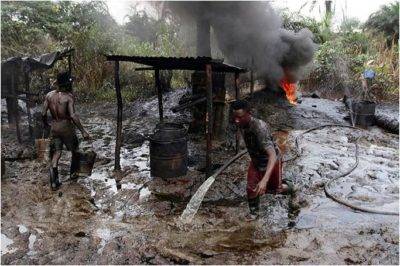Illegal refineries in Nigeria have become a significant national issue, comparable to illicit drugs, child labor, and baby factories. Despite ongoing efforts by the government and local communities to crack down on these operations, they continue to proliferate, particularly in the oil-rich Niger Delta region. The presence of these unauthorized refineries poses severe environmental and economic threats to the country.
Environmentalists warn that the impact on ecosystems is devastating. Illegal refineries, often located in remote forests and villages in states like Abia, Imo, Rivers, Bayelsa, and Ondo, lead to widespread pollution. Oil spills from these sites contaminate water sources with hydrocarbons, making them unsafe for drinking, washing, and irrigation. The air quality is also severely affected due to fumes from burning crude oil, which can cause respiratory problems such as asthma and lung cancer among residents. Furthermore, fires from these illegal operations can burn for days, destroying vast areas of vegetation and displacing wildlife. The unchecked environmental degradation underscores the urgent need for more effective enforcement and preventive measures.
Economic Sabotage and Security Challenges
Illegal refineries also inflict considerable economic damage on Nigeria. According to recent reports, the country loses approximately 10% of its daily oil production to these illicit activities. This significant loss undermines the national economy, which heavily relies on oil revenues. In a startling revelation, the Nigerian National Petroleum Company Limited (NNPC) disclosed that it had deactivated around 6,800 illegal pipelines between 2022 and the present. However, the problem persists as new illegal connections emerge almost as quickly as the old ones are dismantled.
The scale of the issue was highlighted by NNPC’s Group CEO, Mele Kyari, who expressed frustration over the continuous cycle of removal and reappearance of illegal connections. Similarly, Nigeria’s National Security Adviser, Nuhu Ribadu, during a visit to oil and gas facilities in Rivers and Abia states, lamented the daily economic sabotage by illegal refinery operators. He revealed that Nigeria loses an average of 400,000 barrels of crude oil per day to theft, a figure that significantly hampers the country’s economic stability and growth. The persistent loss emphasizes the need for a robust and coordinated response to address both the supply and demand sides of this illegal trade.
Tackling the menace of illegal refineries requires a multifaceted approach involving stringent law enforcement, community engagement, and sustainable economic alternatives for those involved in the illicit trade. Without decisive action, Nigeria’s environmental and economic well-being will continue to be at risk.
Nigeria’s Illegal Refineries and Explosion Crisis
Illegal oil refineries in Nigeria pose a significant threat to both human lives and the environment. Reports from The PUNCH highlight that between 2021 and 2023, explosions at these sites claimed at least 204 lives. These refineries, often operated without proper training or safety equipment, endanger workers and local communities. The lack of safety protocols is a key factor in the high fatality rate, as untrained workers are exposed to hazardous conditions that frequently lead to fatal accidents.
The environmental impact is equally devastating. The crude methods used in illegal refining lead to significant pollution, harming ecosystems and local livelihoods. Toxic spills and fires from these operations contaminate water sources, destroy aquatic life, and degrade soil quality, creating long-term ecological damage. Despite the known dangers, these illegal activities persist, fueled by economic desperation and systemic corruption.
Why Illegal Refineries Persist Despite Crackdowns
The persistence of illegal refineries in Nigeria, despite numerous crackdowns, can be attributed to deep-seated corruption and collusion among community leaders and security forces. Community leaders, who are supposed to oversee and prevent illegal activities, are often implicated in supporting or profiting from these refineries. According to Olufemi Ayodele, Public Relations Officer for the NSCDC in Rivers State, many destroyed refineries resurface due to the complicity of local leaders.
Academic insights also point to the involvement of security agents in perpetuating the problem. Professor Ayo Ayoade from the University of Lagos has accused both conventional and private security personnel of taking bribes and collaborating with illegal refinery operators. This systemic corruption undermines efforts to combat illegal refining, as those tasked with enforcement are often part of the problem. Even high-profile figures like Ekpemupolo, who was entrusted with pipeline security, have faced allegations of colluding with refinery operators, highlighting the pervasive nature of this issue.
Nipping the Menace in the Bud — Experts’ Solutions
Experts agree that while the destruction of illegal refineries is necessary, it is not sufficient to eliminate the menace. Stronger legal frameworks and enforcement are critical. Currently, many culprits escape significant punishment, which undermines deterrence. To effectively curb illegal refining, the government must ensure that those caught face severe penalties.
Additionally, improving the compensation and working conditions for security agents could reduce the temptation to accept bribes. Well-funded and properly motivated security forces are less likely to collude with criminals. Another innovative solution proposed by experts is cooperative ownership of natural resources. By amending the constitution to allow local communities, state, and federal governments to share ownership, there would be stronger incentives for communities to protect their resources and resist illegal activities.
Table of Contents
Discover more from OGM News NG
Subscribe to get the latest posts sent to your email.














